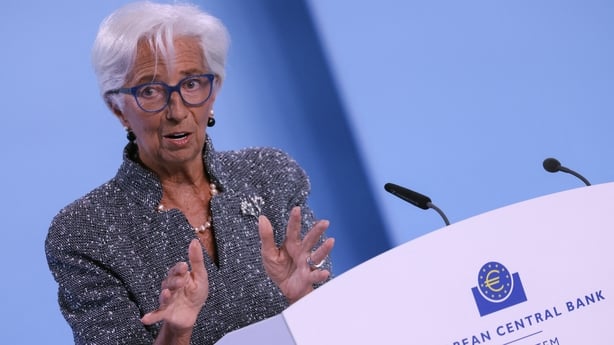There is little surprise that the European Central Bank has moved to cut rates by a further 0.25%.
The bank had increased borrowing costs to apply a brake to runaway inflation.
That job is almost done, but not quite.
The inflation rate was 2.2% last month for the countries which use the euro.
That is close to the ECB's target of 2%, and left the way clear for the bank to cut rates.
It makes it more likely that there will be another 0.25% rate cut in December, however another reduction is not a certainty.
In Ireland, inflation is also on the way down as the Central Statistics Office said its official measure was 1.7%.
That is the first time it has dipped below 2% since the cost-of-living crisis.
Read more: ECB cuts euro zone interest rates again
The next question is who will benefit? When? and by how much?
Tracker mortgage holders will immediately receive a cut from the interest rate decision.
On this occasion, there will be a double benefit for those customers.
The ECB earlier this year had flagged that it would make a technical adjustment of 0.35% to rates which banks use to price tracker loans.
It means those customers will get a 0.6% reduction which would be worth €33 per month for every €100,000 borrowed.
Unfortunately, the picture is less clear for those on standard variable rates.
The Irish banks argue they did not put up rates in line with the ECB's increases as they tried to protect consumers from the burst of inflation.

So many people won't get the benefit of a reduction in ECB rates.
At present the average mortgage rate in Ireland is 4.11% compared to 3.7% across the eurozone.
It is also worth bearing in mind the situation facing many people who have fixed rates expiring this year.
Many of those loans had relatively low monthly repayments but as those fixed periods expire those customers will be facing rates of 4% or 5%.
That could mean a considerable increase in monthly payments.
Financial advisors Pádraic Kissane says he believes there will be downward pressure on variable and fixed rates over time but not immediately.
The key item which will determine future interest cuts, is whether the ECB feels inflation is under control.
At a press conference this afternoon the bank's president Christine Lagarde said she wanted to see inflation return to its target of 2% "in a timely manner".
The ECB is worried about inflation in services which rose from 4.4% to 4.5% and was described by Ms Lagarde as "not satisfactory".
It was partly driven by rising insurance costs and holiday packages.
On the other hand, the bank revised downwards its growth forecasts for the eurozone for 2024, 2025 and 2026.
The danger with the current relatively high interest rates is that they could dampen economic growth.
The ECB says it has not committed to further rate cuts.
But many economists believe another reduction is possible in December.







